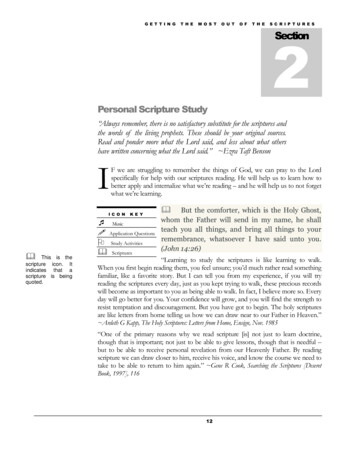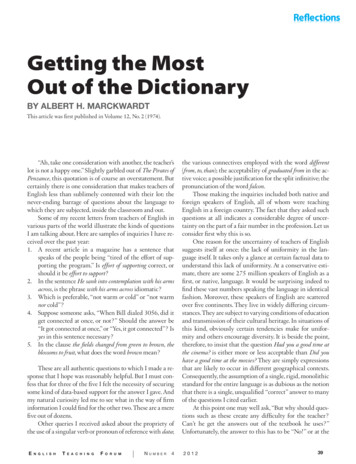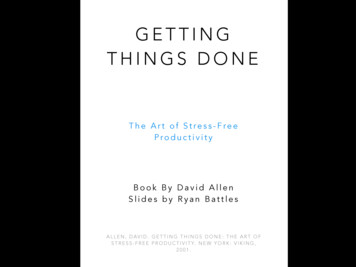
Transcription
G E T T I N GT H EM O S TO U TO FT H ES C R I P T U R E SSection2Personal Scripture Study“Always remember, there is no satisfactory substitute for the scriptures andthe words of the living prophets. These should be your original sources.Read and ponder more what the Lord said, and less about what othershave written concerning what the Lord said.” Ezra Taft BensonIF we are struggling to remember the things of God, we can pray to the Lordspecifically for help with our scriptures reading. He will help us to learn how tobetter apply and internalize what we’re reading – and he will help us to not forgetwhat we’re learning.I C O N This is thescripture icon. Itindicates that ascripture is beingquoted.K E Y Music Application Questions Study Activities Scriptures But the comforter, which is the Holy Ghost,whom the Father will send in my name, he shallteach you all things, and bring all things to yourremembrance, whatsoever I have said unto you.(John 14:26)“Learning to study the scriptures is like learning to walk.When you first begin reading them, you feel unsure; you’d much rather read somethingfamiliar, like a favorite story. But I can tell you from my experience, if you will tryreading the scriptures every day, just as you kept trying to walk, these precious recordswill become as important to you as being able to walk. In fact, I believe more so. Everyday will go better for you. Your confidence will grow, and you will find the strength toresist temptation and discouragement. But you have got to begin. The holy scripturesare like letters from home telling us how we can draw near to our Father in Heaven.” Ardeth G Kapp, The Holy Scriptures: Letters from Home, Ensign, Nov. 1985“One of the primary reasons why we read scripture [is] not just to learn doctrine,though that is important; not just to be able to give lessons, though that is needful –but to be able to receive personal revelation from our Heavenly Father. By readingscripture we can draw closer to him, receive his voice, and know the course we need totake to be able to return to him again.” Gene R Cook, Searching the Scriptures [DeseretBook, 1997], 11612
G E T T I N GT H EM O S TO U TO FT H ES C R I P T U R E SA. Scheduling Time Why is it so hard to consistently read the scriptures? Why do I struggle somuch with myself to be able to read as regularly as I ought to? What aresome of the obstacles that stand in the way of my not being moreconsistent than I am?“Time for scripture study requires a schedule that will be honored. Otherwise, blessingsthat matter most will be at the mercy of things that matter least.” Russell M Nelson,Ensign, Nov 2000Make Time to Immerse Yourself in the Scriptures"As I think about your schedules and the pressures you face at thistime in your lives, I can understand why scripture study can so easilybe neglected. You have many demands pulling at you. In somecases, just maintaining your social life is a full-time occupation. But Iplead with you to make time for immersing yourselves in thescriptures. Couple scripture study with your prayers. Half an houreach morning privately studying, pondering, and communicatingwith your Heavenly Father can make an amazing difference in your lives. It willgive increased success in your daily activities. It will bring increased alertness toyour minds. It will give you comfort and rock-steady assurance when the stormsof life descend upon you." M. Russell Ballard, "Be Strong in the Lord, and in thePower of His Might" (CES fireside for young adults, March 3, 2002)“Make the habit of reading something each day the primary objective of [your]program. The goal [is] to establish an attitude, to raise the scriptures in [y]ourawareness. [Brother Whiting] did not specify how much we should study each day,nor did he suggest that we study in a specific way. We were simply encouraged toread the scriptures every day, no matter how briefly, and to keep a record of howmany consecutive days we had read, even if we read only one verse. Using thissimple approach, we could read a few verses or ten pages on any given day. Wecould read through the scriptures sequentially, or we could study topics , wewere still having success and maintaining our scripture study habit as long as weread even one verse during the day. The idea, of course, is to establish a habit offrequent contact with the scriptures The method used to develop this habit isnot particularly important. What is important is to develop the attitude that thescriptures are an essential part of our daily lives.” Bruce T Harper, Daily ScriptureStudy: Seeking the Influence of the Spirit, Ensign, June 1984, 31 How can I make scripture study a priority? Why is frequent contact withthe scriptures so important to my spiritual health?“Let us place higher priority on family prayer, family scripturestudy, and family home evenings and eliminate those activities that fill ourlives with worldliness and evil.” L Tom Perry, A Year of Jubilee, Ensign, November 199913
G E T T I N GT H EM O S TO U TO FT H ES C R I P T U R E SThrough daily study of the scriptures and the words of the modern-day prophets,we can keep our values in line with the will of our Heavenly Father. The scriptureslead us “to the fountain of living waters, or to the tree of life; which waters are arepresentation of the love of God.” (1 Ne. 11:25.) Joseph B Wirthlin, The Straightand Narrow Way, Ensign, November 1990“The scriptures are spiritual food for our spirit, which is just as important asphysical food for our body.” L Lionel Kendrick, Search the Scriptures, Ensign, May1993 What things often keep me from reading the scriptures every day? Whatcan I do to overcome these obstacles to my scripture reading?“I fear that many of us rush about from day to day taking for grantedthe Holy Scriptures. We scramble to honor appointments with physicians, lawyers,and businessmen. Yet we think nothing of postponing interviews with Deity—postponing scripture study. Little wonder we develop anemic souls and lose ourdirection in living. How much better it would be if we planned and held sacredfifteen or twenty minutes a day for reading the scriptures. Such interviews withDeity would help us recognize his voice and enable us to receive guidance in all ofour affairs. We must look to God through the scriptures” Carlos E Asay, Ensign,Nov. 1978, pp. 53–54“It is certain that one who studies the scriptures every day accomplishes far morethan one who devotes considerable time one day and then lets days go by beforecontinuing. Not only should we study each day, but there should be a regular timeset aside when we can concentrate without interference. A quarter of an hour islittle time, but it is surprising how much enlightenment and knowledge can beacquired in a subject so meaningful. The important thing is to allow nothing elseto ever interfere with our study” Howard W Hunter, Reading the Scriptures, Ensign,Nov. 1979, p. 64“Those who delve into the scriptural library find that to understand requires morethan casual reading or perusal—there must be concentrated study. One who studiesthe scriptures every day accomplishes far more than one who devotes considerabletime one day and then lets days go by before continuing.” Howard W Hunter, Ensign,Nov 1979, 64“If we’re not reading the scriptures daily, our testimonies are growing thinner, ourspirituality isn’t increasing in depth.” Harold B. Lee, Seminar for RegionalRepresentatives of the Council of the Twelve, Dec. 12, 1970.14
G E T T I N GT H EM O S TO U TO FT H ES C R I P T U R E SB. The Role of the Holy Ghost in Scripture StudyWhat does it mean to hear the voice of the Lord through thescriptures? What do I have to do so that those spiritual impressionswill come into my mind as I read, so that those feelings will come intomy heart? What do I have to do so that my mind can be enlightenedand my soul enlarged? How can I cause the word to become delicious to me? Scriptures and the Holy Ghost"Because they expound the doctrine of Christ, the scriptures areaccompanied by the Holy Spirit, whose role it is to bear witnessof the Father and the Son (see 3 Nephi 11:32). Therefore, beingin the scriptures is one way we receive the Holy Ghost. Ofcourse, scripture is given through the Holy Ghost in the firstplace (see 2 Peter 1:21; D&C 20:26–27; 68:4), and that same Spiritcan attest its truth to you and me. Study the scriptures carefully,deliberately. Ponder and pray over them. Scriptures are revelation,and they will bring added revelation." D. Todd Christofferson, "The Blessing ofScripture," Ensign, May 2010, 35“Search the scriptures – search the revelations which we publish, and ask yourHeavenly Father, in the name of His Son Jesus Christ, to manifest the truth untoyou, and if you do it with an eye single to His glory, nothing doubting, He willanswer you by the power of His Holy Spirit. You will then know for yourselvesand not for another. You will not then be dependent on man for the knowledge ofGod; nor will there be any room for speculation.” Joseph Smith“We shall experience the Holy Ghost broadening our understanding, find newinsights, witness an unfolding pattern of all scripture; and the doctrines of theLord shall come to have more meaning to us than we ever thought possible. As aconsequence, we shall have greater wisdom with which to guide ourselves andourfamilies.” Spencer W Kimball, Teachings of Spencer W Kimball, ed. Edward L. Kimball[Salt Lake City: Bookcraft, 1982], 135“Let us this year seek to read and understand and apply the principles and inspiredcounsel found within the [scriptures]. If we do so, we shall discover that ourpersonal acts of righteousness will also bring personal revelation or inspiration whenneeded into our own lives.” Spencer W Kimball, Always a Convert Church, Ensign,Sept. 1975, p. 4Hear the Voice of the Savior through the Scriptures“Communication from the Lord about divine truth or spiritual knowledge isfound in the scriptures. It is called revelation—literally, “to make known oruncover” (Bible Dictionary, “Revelation,” 762). Charles Didier, Mans Search forDivine Truth, Ensign, Nov. 200515
G E T T I N GT H EM O S TO U TO FT H ES C R I P T U R E S"I find that if I pray not only to have a witness of the truthfulness ofthe scriptures but also to have the Spirit with me as I read, mysensitivity is heightened, and I see ever so much more clearly. I cansee where I am in my life and where my Heavenly Father wants meto be. I can understand principles of truth, and I can see how tomake the needed changes in my life. I can feel assured that the Lordwill help and strengthen me to accomplish the task. Thus the scriptures becomewritten in my life. When we read the scriptures we are hearing the voice of theSavior. He is not absent from our lives. He is actively positioned in the verses ofthese holy books." Cheryl C. Lant, "My Soul Delighteth in the Scriptures," Ensign,Nov. 2005“The voice of the Lord may be received by listening to the Lord’s servants,studying the scriptures, and being prompted through the inspiration of the HolyGhost. And for those who not only hear but those who hearken to the Lord’svoice, the Lord calls them “mine elect,” “for mine elect hear my voice and hardennot their hearts” (D&C 29:7).” Francisco J. Vińas, Listening to the Voice of the Lord,Ensign, Nov 1996“It is a commandment from the Lord that members be diligent and study the fundamental truths of the gospel Every baptized person [can] have anabiding testimony , but [it] will grow dim and eventually disappear [without]study, obedience, and diligent seeking to know and understand the truth.” JosephFielding Smith“The scriptures are priceless possessions. If we search the scriptures, seeking for theplain and precious principles, the Lord will reveal his will unto us and we will be richlyblessed. If we research the revelations and respond correctly to them, we will returnhome safely to Heavenly Father.” L Lionel Kendrick, Search the Scriptures, Ensign, May1993 What have I done to make my own scriptures study more meaningful?What role do fasting and prayer play in my scripture study? Why do I needto pray when I read the scriptures?And they shall give heed to that which is written, and pretend tono other revelation; and they shall pray always that I may unfold thesame to their understanding. (Doctrine and Covenants 32:4)We Can Make the Scriptures More Meaningful in Our Lives (YW Manual)There are many ways we can study the scriptures. Finding answers to specificproblems is only one way. Other ways may include:1. We can read them through from start to finish.2. We can study them by subject, using the Topical Guide, Index, orGospel Principles manual as our guide.3. We can follow the seminary or Sunday School course of study.16
G E T T I N GT H EM O S TO U TO FT H ES C R I P T U R E S4. We can compile and memorize a list of special scriptures that helpand inspire us.5. We can look for answers to a specific need or problem.“The Holy Scriptures and the spoken word of the living prophetsgive emphasis to the fundamental principles and doctrines of thegospel. The reason we return to these foundational principles, to thepure doctrines, is because they are the gateway to truths of profoundmeaning. They are the door to experiences of sublime importancethat would otherwise be beyond our capacity to comprehend. Thesesimple, basic principles are the key to living in harmony with God and man. Theyare the keys to opening the windows of heaven. They lead us to the peace, joy, andunderstanding that Heavenly Father has promised to His children who hear andobey Him.” Dieter F Uchtdorf, Of Things that Matter Most, Ensign, Nov. 201017
G E T T I N GT H EM O S TO U TO FT H ES C R I P T U R E SC. Scripture Marking Tips and Techniques Why is scripture marking and cross-referencing so important? What techniques are there for marking my scriptures?Elder Cook gives several reasons for marking and cross referencing: “[1]Cross referencing increases understanding. It gives you insights youotherwise would not have had. It shows you a unity in the scriptures – and a depth. [2]Part of cross-referencing is checking the footnotes. When we find footnotes to theTopical Guide, the Bible Dictionary, or the Joseph Smith Translation, we open a doorto greater knowledge and greater truth. [3] When you are marking the scriptures, tryingto pick out important parts, it keeps you focused on what you’re reading. It helps youanswer the question, What is the most important point in this verse? [4] Markingincreases understanding. When you’re reading close enough to make markings, youlearn more than when you’re just racing through the pages. [5] Marking helps theremembering process when you reread. If you have marked an as or thus, you willquickly remember, on review, what it was you saw in that verse. [6] Marking helps youfind things more quickly. When I go back to find a verse, I can often find it in aninstant – because I carefully marked what was impressive to me. [7] The practice ofmarking and cross-referencing also yields results in indirect ways. When you take thetime, thought, and energy to understand the scriptures by marking and crossreferencing them, you’re showing a deep desire to learn, as well as a respect for theword of the Lord. In return, he will bless you in wonderful ways, both directly (in termsof scriptural understanding) and indirectly (in terms of other spiritual gifts)” Gene RCook, Searching the Scriptures, 91-92It is helpful to mark scriptures, highlighting story lines, themes, andprinciples so they will be easy to find. This can be likened to a personalfiling system. There is no single way to mark scriptures. Your marking system shouldreflect your approach to scriptures study. (Teaching No Greater Call p. 57)Mark just the keywords in a verse.This creates a highlighted version of the chapter or section that you can scan quickly topick out the main concepts. (Teaching No Greater Call, 58)Circle or underline key words and with a straight line, link together those that relateclosely to one another (Teaching No Greater Call, 58)Mark an entire verse or block of verses and link the key words within that passage.(Teaching No Greater Call, 58)Brackets – SectionalizingSectionalizing is when you draw lines in your scriptures to create ‘sections’ or groupingsof scriptures that are talking about the same theme. For example: in the first sectionyou would draw a line above the first verse and then another line below the last verse.Then you write the given phrase in the margin between those 2 lines.18
G E T T I N GT H EM O S TO U TO FT H ES C R I P T U R E SNumbered ListsNotice when a series of related points is mentioned and number the points within thetext or in the margin.Cross-ReferencingScripture linking (scripture chains) can be a valuable tool in your own personalscripture study as well as when you teach. Compile a list of scriptures based on topic.In the margin beside each scripture passage, write the reference of the next passage inthe list. Continue doing this until you reach the last passage. Beside the last passagewrite the reference to the first one. Then you can start at any point on the list andcontinue through the chain until you have read all the passages. (Teaching No GreaterCall, 58)Using the FootnotesThe footnotes contain several kinds of information. They contain alternate Greek (GR)or Hebrew (HEB) translations for selected words. They contain references to theTopical Guide (TG). They also contain explanations of idioms and difficultconstructions (IE). Footnotes with the notation ‘JST’ are excerpts from Joseph Smith’sinspired translation of the Bible. Short Joseph Smith Translation entries are in thefootnotes. Longer entries appear in a special section in the appendix, immediately afterthe Bible Dictionary.The most common type of footnote is a cross-reference to other scripture passages inthe standard works. These additional passages often clarify or add insight to thepassage you are reading. (Teaching No Greater Call, 56)Margin NotesMaking notes in the margins of your scriptures can be a valuable way to personalize thescriptures. Such notes provide a way to record insights, identify cross-references thatare important to you, and record ways that you can apply scripture passages in yourdaily life. (Teaching No Greater Call, 58) Margin notes can easily be added andremoved if you use sticky notes to record your notes on. (Teaching No Greater Call,58)Additional Study Aids Chapter Headings – provides an overview of the chapter or section thatfollows. It may include information about doctrine, historical context, orpeople. (Teaching No Greater Call, 56) The Index to the Triple Combination The maps in the Triple Combination – by knowing the geography of the landsdiscussed, learners can better understand events described in the scriptures.”(Teaching No Greater Call, 57) The Topical Guide – intended to help the reader find scriptures most oftenused in gospel classes and study. Because of space limitations, the the guide isnot intended to be comprehensive. It is also recommended that the readerlook up each scripture and examine it in its context, in order to gain a betterunderstanding of it. (Topical Guide – Introduction)19
G E T T I N G T H EM O S TO U TO FT H ES C R I P T U R E SThe Bible Dictionary – a teaching and study resource that providesexplanations of names and places mentioned in the Bible. It also proved shortarticles on cultural items and a few key doctrines such as the Atonement,baptism, the Holy Ghost, and resurrection. It includes a chronology ofimportant dates. (Teaching No Greater Call, 56)The Joseph Smith TranslationThe maps in the back of the BibleThe computerized scriptures – such programs can enable you to search a wordor combination of words in the scriptures and they will give you the resultliterally in an instant.“We ought to have a church full of women and men who know the scripturesthoroughly, who cross-reference and mark the, who develop lessons and talks out ofthe Topical Guide, and who have mastered the maps, the Bible Dictionary, and theother helps that are contained in this wonderful set of standard works Not in thisdispensation, surely not in any dispensation, have the scriptures – the enduring,enlightening word of God – been so readily available and so helpfully structured forthe use of every man, woman, and child who will search them. The written word ofGod is in the most readable and accessible form ever provided to lay members in thehistory of the world. Surely we will be held accountable if we do not read them.” Howard W Hunter, Satellite address to religious educators, 10 Feb 1989What Should I use to Mark My Scriptures? Pens – scrapbooking pens are acid free. Some ofthe best include Micron pens, Martha Stewartpens and Zig pens. The 05 sizes typically workthe best Pencils – marking pencils, pencil crayons or a mechanical pencil work well Stickers – scripture stickers can be made by printing words or photos ontotransparent mailing labels, cutting them apart and placing them in yourscriptures20
G E T T I N GT H EM O S TO U TO FT H ES C R I P T U R E SD. The Scriptures: My Spiritual Workbook Why should I read the Book of Mormon on an ongoing basis?“We can record what the Lord gives to us. As you read the scriptures, make anote of the ideas, feelings, impressions, and understandings youreceive. I always read with a pad of paper or a dictaphone nearby. When I find agreat truth, I either take the time to write it down or I dictate my thoughts andfeelings onto a tape. That way I can show the Lord that I esteem his words, and Ican be sure not to lose what I have been given.” Gene R Cook, Searching theScriptures, 112Studying the Scriptures"Once in a while I invest in a new copy of the Book of Mormon.When I start reading that new book, I make notes in the marginsso I have a record of what I am learning as I study. To help meremember what I am learning, I draw lines to connect ideas. Ishade verses and underline key words. When I find ideas that relateto each other, I make a scripture chain to link those ideas (see"Scripture Linking," Teaching, No Greater Call [1999], 58). I liketo think of my scriptures as a workbook, so sometimes I record where I was whenI gained an insight or the name of the person who taught me. That way theexperience is refreshed in my memory when I read that passage again." Julie B.Beck, "My Soul Delighteth in the Scriptures," Ensign, May 2004"It would be impossible to learn the lessons the scriptures contain by reading themonly one time through or studying selected verses in a class. . . . The Lord has toldus that our time should 'be devoted to the studying of the scriptures' (D&C 26:1)and that 'the Book of Mormon and the holy scriptures are given. . . for [our]instruction' (D&C 33:16)." Julie B. Beck, "My Soul Delighteth in the Scriptures,"Ensign, May 2004 Where does the Lord keep his scriptures? and the scriptures shall be given, even as they are inmine own bosom, to the salvation of mine own elect. (Doctrineand Covenants 35:20)“The Lord has his scriptures in his own bosom, as it were, deep in his own heart.The challenge is for us to get them there as well, to live the words, to teach thewords, to have them burning in our hearts. As we do that, they will be in ourbosoms. Then, when we stand up to speak and testify, we will speak the words ofthe Lord through his Spirit, as does the Lord himself.” Gene R Cook, Searching theScriptures [Deseret Book, 1997], 12221
G E T T I N GT H EM O S TO U TO FT H ES C R I P T U R E SWhat It Means to Study"For the gospel to be written in your heart, you need to know what it isand grow to understand it more fully, . . . sometimes reading a fewverses, stopping to ponder them, carefully reading the verses again, andas you think about what they mean, praying for understanding, askingquestions in your mind, waiting for spiritual impressions, and writingdown the impressions and insights that come so you can remember and learnmore. Studying in this way, you may not read a lot of chapters or verses in a halfhour, but you will be giving place in your heart for the word of God, and He willbe speaking to you." D. Todd Christofferson, "When Thou Art Converted," Ensign,May 2004Taking Notes“I’ve found, as I’m sure you have, that when you’retrying to learn from the Lord and you feel an impressionfrom the Spirit Its important to make a note so it willnot be forgotten. The more you not only hear but abideby what you’ve been told, the more the Lord will give toyou. It will come more and more rapidly and you willbegin to hear and feel those impressions of the Spiritmore quickly than you have previously done.” Gene R Cook, Address to ReligiousEducators, 1 September 1989“Knowledge carefully recorded is knowledge available in time of need. Spirituallysensitive information should be kept in a sacred place that communicates to the Lordhow you treasure it.” Richard G ScottMaking Your Own Scripture Study JournalA scripture journal allows you to freely record your thoughts and feelings as you studythe scriptures. You may feel to record your testimony, record insightful quotes, makelists, draw pictures and set goals. A spiritual journal is a study tool where you canrecord personal spiritual writings and notes, create your own spiritual quote book,become intimately acquainted with truths, gain a deeper understanding of Holy books,and come to know both God and yourself.Below is a list of ideas for making, organizing and keeping a scripture study journal thatcan be a blessing and a resource to you as you study the scriptures. These ideas arecollected from many different people and are not specifically given by generalauthorities. Write in two different colors – one forthoughts pertaining to the verse at hand andone for personal promptings that come asyou read. Create charts that list doctrines andprinciples you learn about in your study.The process of studying pondering andwriting a formula is always insightful.22
G E T T I N GT H EM O S TO U TO FT H ES C R I P T U R E S Writing down what you learnshows and helps you feel adeeper sense of gratitude for thethings that you learn. Organize your study journal intotopics. You might find a binderwithalphabeticaltabsconvenient to use, or simplywrite topics on the tops of yournotebook pages. Use glue-ins of favorite quotes,images or stories that touch your heart as you study and learn the gospel. If you like using the computer, learn how to use a word processing programthat lets you index your entries. In this way, you will easily be able to access thethings you have learned on any given topic no matter where in your journal itmay appear. (If you do this, make sure to make a backup copy regularly in caseyour computer crashes – you don’t want to lose your journal)23
G E T T I N GT H EM O S TO U TO FT H ES C R I P T U R E SE. Using the Scriptures to Meet Personal Needs How can I get more out of my personal scriptures study?“The primary reason we read the scriptures is to hear the voice of the Lordspeaking to us, giving us revelation and instruction and causing us to havethose deep feelings of peace and love that come through the Spirit.” Gene R Cook,Searching the Scriptures, 43Ask for help during prayer.Pray always before you begin to read the scriptures. Slow your mind down and befree from this world. Also, pray all the while you read—as certain conceptsof the gospel illuminate your soul or as you have questions. Don’t hesitateto call upon your Father. Lesson 27, Young Women Manual 1“First, we need to prepare ourselves by praying in faith – not just once in a while,but every time we read We need to pray over every page we read” Gene R Cook, Searching the Scriptures, 44Be Humble“ A humble spirit can more readily be in tune with God’s Spirit. We canhumble ourselves by: remembering how truly merciful the Lord is to us inour sins and weaknesses, letting our hearts be filled with gratitude for allthe Lord has done for us, realizing how dependent we are on the Lord forhis gifts and his blessings.” Gene R Cook, Searching the Scriptures, 45Search the scriptures carefully as you read.Ask questions as you read the scriptures. Question and then call upon theLord. As I questioned, the doors of my heart unfolded and left room forthe Holy Ghost to dwell in me. Lesson 27, Young Women Manual 1One who searches diligently will: “ponder while you’re reading, whileyou’re reading, continually ask the Lord questions about the verses andgive him a chance to answer, seek to discover the patterns the Lord hasgiven us in the scriptures, mark and cross-reference the things that areimportant to you, apply what you are reading to yourself.” Gene R Cook,Searching the Scriptures, 45 [See more on patterns at the end of this section]“I have become convinced that the scriptures are mostly an answer book.Virtually every verse has one or more answers to important question” Gene R Cook, Searching the Scriptures, 55“As we seek out answers from the scriptures, we need to be very carefulnot to use our own definitions for words We can’t even rely on adictionary definition. Instead, we need to find out what the Lord means.” Gene R Cook, Searching the Scriptures, 5824
G E T T I N GT H EM O S TO U TO FT H ES C R I P T U R E SPonder what you have read and be sensitive to promptings of the Holy Ghost.Stop many times during the day and ponder the single thought that you have searchedout in depth. For instance, consider the truth ‘love your neighbor asyourself.’ Repeat the scripture, question your every action, and keep thethought with you on a small card. Lesson 27, Young Women Manual 1“Pondering is a form of prayer. Pondering and prayer are so tightly linked thatwhen I start to ponder I automatically offer a silent prayer: ‘Help meunderstand this, Heavenly Father. Help me to kn
“Search the scriptures – search the revelations which we publish, and ask your Heavenly Father, in the name of His Son Jesus Christ, to manifest the truth unto you, and if you do it with an eye single to His glory, nothing doubting, He will answer you by the power of His Holy Spiri











